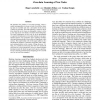Free Online Productivity Tools
i2Speak
i2Symbol
i2OCR
iTex2Img
iWeb2Print
iWeb2Shot
i2Type
iPdf2Split
iPdf2Merge
i2Bopomofo
i2Arabic
i2Style
i2Image
i2PDF
iLatex2Rtf
Sci2ools
109
click to vote
AAAI
2008
2008
Zero-data Learning of New Tasks
We introduce the problem of zero-data learning, where a model must generalize to classes or tasks for which no training data are available and only a description of the classes or tasks are provided. Zero-data learning is useful for problems where the set of classes to distinguish or tasks to solve is very large and is not entirely covered by the training data. The main contributions of this work lie in the presentation of a general formalization of zero-data learning, in an experimental analysis of its properties and in empirical evidence showing that generalization is possible and significant in this context. The experimental work of this paper addresses two classification problems of character recognition and a multitask ranking problem in the context of drug discovery. Finally, we conclude by discussing how this new framework could lead to a novel perspective on how to extend machine learning towards AI, where an agent can be given a specification for a learning problem before att...
Related Content
| Added | 02 Oct 2010 |
| Updated | 02 Oct 2010 |
| Type | Conference |
| Year | 2008 |
| Where | AAAI |
| Authors | Hugo Larochelle, Dumitru Erhan, Yoshua Bengio |
Comments (0)

